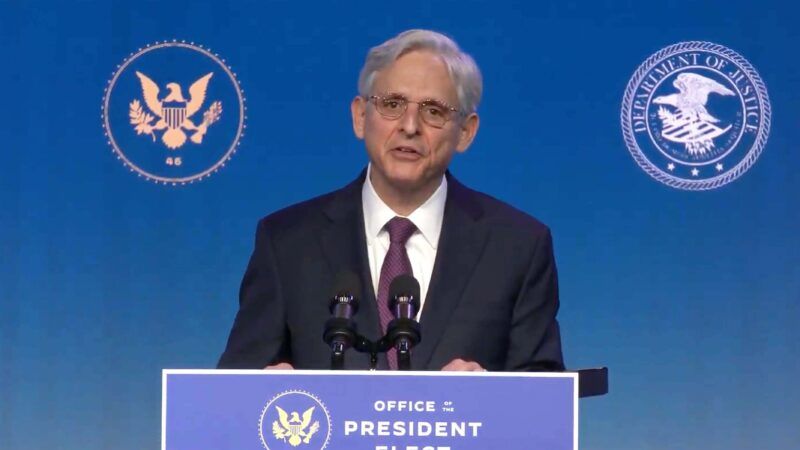Merrick Garland's Worrying Record on Criminal Justice Reform
What to expect from Joe Biden’s pick for attorney general.

The Senate Judiciary Committee will kick off confirmation hearings today for Merrick Garland, the former federal prosecutor and long-serving federal judge tapped by President Joe Biden to serve as the next U.S. attorney general. In an open letter to the nominee, Cynthia W. Roseberry of the American Civil Liberties Union urges Garland to use his hearings as an opportunity "to make clear, on-the-record commitments" to various criminal justice reform efforts, such as vowing to "reduce mass incarceration," "unwind the War on Drugs, starting with marijuana," and hold "police departments and officers accountable for misconduct."
That is certainly a welcome agenda for the next attorney general. Unfortunately, Garland's judicial record suggests that he might not always satisfy the high hopes of criminal justice reform advocates.
Take the Fourth Amendment. In 2003, the U.S. Court of Appeals for the District of Columbia Circuit issued its decision in a case known as United States v. Brown. At issue was whether a warrantless car search violated the Fourth Amendment. Judge Garland wrote the opinion that ruled for the cops. In dissent, one of his colleagues charged Garland with "cobbling together innocent circumstances, and drawing inferences in favor of the government that are unsupported by the evidence."
The matter originated with reports of gunfire in the parking lot of a Washington, D.C., apartment building on the night of April 13, 2001. Several hours after the reports came in, two officers from the Metropolitan Police Department arrived on the scene. A building resident told the officers that the occupants of a parked white car might be involved. According to the officers' account, while questioning the folks in the white car, they became suspicious about the occupants of a black car that was parked nearby, claiming that one of the black car's occupants seemed to be "sizing us up."
The officers approached the black car. After knocking on a rear window, Officer Joshua Branson opened a rear door to get a better look inside. He spotted a handgun on the floor. That led him to pull Rocky Lee Brown out of the car and place him in handcuffs. Officer Branson then took the keys out of the ignition, opened the trunk, and discovered an AR-15 rifle and several rounds of ammunition.
In Terry v. Ohio (1968), the U.S. Supreme Court held that police officers must have a "particularized suspicion" of criminal wrongdoing before conducting that sort of investigatory stop. An officer's "inchoate and unparticularized suspicion or 'hunch,'" the Court stressed, is not enough to create an exception to the Fourth Amendment's guarantee against unreasonable searches and seizures.
Garland's opinion in U.S. v. Brown, however, granted Officer Branson exactly the sort of hunch-based leeway that Terry prohibited. Indeed, as Judge Judith Rogers complained in her dissent from Garland's judgment, "there was no evidence that the police had any grounds to think the occupants of the black car, which was lawfully parked in a residential lot, were guilty of a traffic violation or engaged in any criminal activity….So far as the government's evidence indicated, the occupants of the black car were innocent, uninvolved bystanders and nothing more."
During his long stint on the D.C. Circuit, Garland tended to tip the scales in favor of law enforcement in these sorts of disputes, practicing a style of judicial deference that gave police and prosecutors the benefit of the doubt. Time will tell if Attorney General Garland will follow suit.
